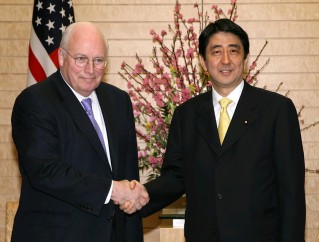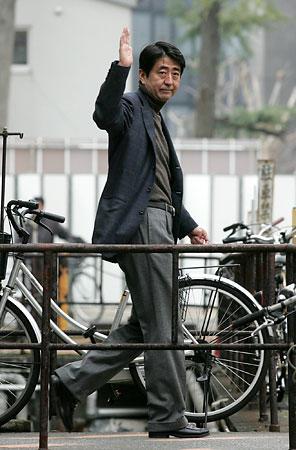Put these two men in a room together and magic happens:

And please, read on to learn of this historic meeting of the minds!
Abe, Cheney Reaffirm Unity On Abduction Issue, Iraq
TOKYO (Kyodo)–Japanese Prime Minister Shinzo Abe and U.S. Vice President Dick Cheney agreed Wednesday to boost the bilateral alliance and cooperate to resolve the issue of North Korea’s past abductions of Japanese citizens as a common matter of the two nations.
Cheney expressed U.S. understanding over Japan’s policy of not offering energy aid to North Korea due to the abduction issue, while Abe gave reassurances over Tokyo’s support for U.S. efforts in Iraq and its commitments to promoting missile defense and U.S. military realignment, Japanese officials told reporters.
OK, I’m asleep now. I fell asleep just reading this article. Could there be a less relevant visit to Japan by an American leader? I mean, sure Cheney isn’t going for no reason at all, but he and his staff are just decidedly disinterested in making his visit media-friendly. I guess we can wait and see if Cheney is trying to get anything concrete out of Japan in terms of Iraq support, or if he focused more on easing so-called “tensions” in the security alliance that are so slight as to be almost figments of the media’s imagination in their struggle to wrap some narrative around this dull, dull official visit.
My own theory on why Cheney’s there: he’s actually trying to reaffirm US-Japan unity in the six-party negotiations amid accusations that the US is pressuring Japan to back off on its insistence that North Korea make progress in resolving the issue of NK abductions of Japanese citizens before Japan provides NK with any aid. Cheney will be meeting with the parents of abductee Yokota Megumi tomorrow, which will probably be the highlight of media coverage on the Japanese side. Meanwhile, the American media-consuming public will be subject to images of Cheney strolling off the plane and addressing a crowd of adoring troops on the USS Kittyhawk. And conveniently enough, the Scooter Libby trial is about to end, so some attention can be deflected from the torrent of negative press the trial has given Cheney and his shady attempts to manipulate the media. Or more likely still, the longer Cheney’s out of the country, the longer he can avoid answering questions about Libby etc. Thankfully, Cheney will return to his now-famous undisclosed location after the trip is over.

